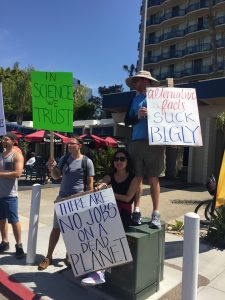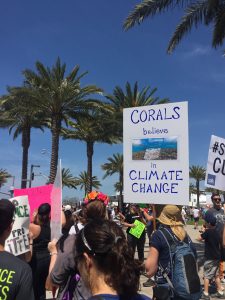BY BAR YOSEF| SQ ONLINE WRITER | SQ ONLINE (2016-17)
____________________________________________________________________________
On Earth Day, 15,000 people gathered in downtown San Diego and marched from Civic Center Plaza to Waterfront. When asked why she marched, middle school science teacher Kimberly Carpenter said, “So many things.” And the signs carried by the marchers reflected this. Signs included remarks about climate change, scientific funding, diseases cured by science, and more. Science puns abounded and references were made to Trump, despite march organizers calling the march nonpartisan.

While the posters spanned issues and topics, they sent a unified message that scientists feel as though science is being devalued in the current political climate. Many fear that science funding, most of which comes from the federal government, will be cut. UCSD was well represented at the march. A large group from the Salk Institute were present, wearing shirts with the phrase “Science Cures.” Joe Larkin, a researcher at the Süell Lab in the Division of Biological Sciences, said, “In politics, virtually all of our salaries are paid for with tax money. All of the equipment is bought with tax money so in politics, I would appreciate if more people cared about using public funds for science. There’s no place for a lot of the scientific enterprise in the private sector, but I think they’re extremely important for humanity, the country, the culture, etc.” Larkin feels that the Twitter feed of the House of Representatives Science Committee, which in December shared a Breitbart Article denying climate change, is anti-science and represents the views of Congress.

Scientists feel that politicians are not making evidence-based decisions, specifically in regards to climate change. Carpenter said, “I am concerned about the lack of science being used in making laws and decisions. The fact that we have people who don’t believe in vaccines…The fact that we have people who don’t want to look at climate change…Our decision making not being fact-based worries me.”
The decision to hold the march on Earth Day reflects the organizers’ belief that climate change denial is a major concern. Maria Redig, who works for KMEA, an environmental consulting company that is contracted by various federal agencies, said, “It’s getting really scary working in a regulation-based agency and kind of this fear of policies not backing the need for regulation and the need to adequately monitor and control changes in the environment.”
While Redig, like many other scientists, is engaging with activism for the first time, Carpenter has been politically active for over forty years. Her first rally was when she was eighteen during the Vietnam War, the day Richard Nixon was inaugurated for the second time. Since then, much of the work she has done politically has been around women’s rights and abortion rights. She said, “I’ve spent 15 or 20 years of my

life in front of a clinic defending a woman’s right to choose against picketers and protesters, including a week spent in a bulletproof vest because somebody told me, ‘I am so pro-life, if I get a chance I will kill you’.” For her, the March for Science is a continuation of a lifetime of political activism. Other marchers wore women’s march “pussy hats” or San Diego Women’s March stickers, conveying a connection between the two marches. Non-science issues were also brought up by speakers like California Senate President Pro Tem Kevin de Leon, who said, “One-half of our scientists in California today are immigrants,” an allusion to Trump’s anti-immigration policies.
The national March for Science struggled with questions of identity politics in planning the march. While organizers feared that connecting the march to other issues would portray the march as partisan, they included diversity, which remains a problem in science, in their platform. Today, women are thirty percent of the STEM workforce, and are paid less than men, while minorities represent only thirteen percent of the STEM workforce. Marchers, like a woman wearing a sign that said, “This is what an aerospace engineer looks like,” displayed that underrepresented groups are still fighting for their place in science.
One marcher carried a sign with a Thomas Jefferson quote, “science is my passion. Politics, my duty.” Scientists feel a duty to politicize because they believe their funding is being threatened and their expertise unappreciated, with politicians making science-related decisions without consulting scientists. Some marchers also feel that the scientific process, channeled in politics through evidence based decision making, is being replaced by policy based solely on political ideology. So while the march was called the March for Science and people marched for “so many things,” it can be seen as a march for truth, for which science exists.

[hr gap=”0″]
Sources:
- http://timesofsandiego.com/politics/2017/04/22/15000-march-for-science-in-san-diego-in-plea-to-policy-makers/
- http://www.nbcnews.com/news/us-news/house-science-committee-tweets-climate-change-denying-breitbart-article-debunked-n690986
- https://www.theatlantic.com/science/archive/2016/12/how-trump-could-wage-a-war-on-scientific-expertise/509378/
- https://www.theatlantic.com/politics/archive/2016/12/donald-trump-climate-change-skeptic-denial/510359/
- http://www.latimes.com/politics/la-pol-ca-pink-hats-womens-march-20170115-story.html
- https://www.vox.com/science-and-health/2017/3/24/15028396/march-for-science-diversity
- https://www.theatlantic.com/science/archive/2017/04/how-the-march-for-science-finally-found-its-voice/524022/
- http://www.sandiegouniontribune.com/visuals/photography/sd-march-for-science-in-san-diego-20170422-photogallery.html
- http://time.com/4698781/coral-reefs-climate-change-conservation/
